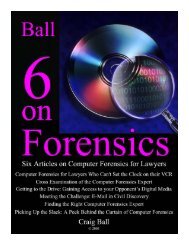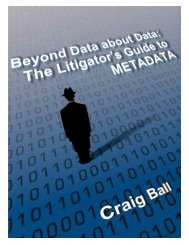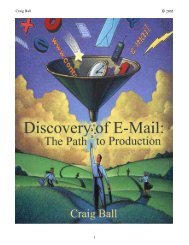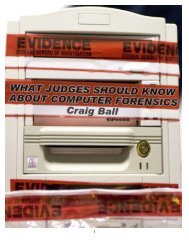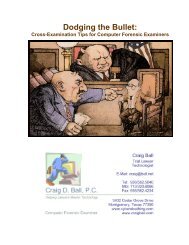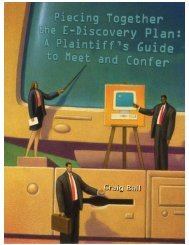Five on Forensics Page 1 - Craig Ball
Five on Forensics Page 1 - Craig Ball
Five on Forensics Page 1 - Craig Ball
Create successful ePaper yourself
Turn your PDF publications into a flip-book with our unique Google optimized e-Paper software.
<str<strong>on</strong>g>Five</str<strong>on</strong>g> <strong>on</strong> <strong>Forensics</strong><br />
© 2002-2008 <strong>Craig</strong> <strong>Ball</strong> All Rights Reserved<br />
as quotas are reached. When you tell employees that you are going to force them to delete<br />
what many view as essential informati<strong>on</strong>, not surprisingly some become quite resourceful at<br />
retaining e-mail despite company policy. Avoidance tactics take many forms, but whether it’s<br />
forwarding older mail back to your own mailbox to circumvent time restricti<strong>on</strong>s or burning<br />
private caches of CDs, such guerilla tactics jeopardize a company’s ability to manage their e-<br />
mail systems and accurately resp<strong>on</strong>d to discovery. That’s bad social engineering. An<br />
enterprise embroiled in litigati<strong>on</strong> may vehemently deny the existence of resp<strong>on</strong>sive e-mail,<br />
<strong>on</strong>ly to find that an enterprising employee has a “private stash” of clearly-discoverable e-mail<br />
which does not come to light until the employee deems disclosure of that e-mail<br />
advantageous. As attorney Tom Watkins of Austin puts it, “E-mails are the cockroaches of<br />
litigati<strong>on</strong>. You can’t get rid of them, and they always manage to turn up when company<br />
comes to call.”<br />
Soluti<strong>on</strong>: Build instituti<strong>on</strong>al awareness of the hazards of kamikaze computing. Train,<br />
m<strong>on</strong>itor, audit and enforce. People try to get away with stuff because they can. Make<br />
it harder to cheat, and put real teeth in the policy. Help employees appreciate the risk<br />
to their company and their jobs posed by social engineering errors, and put peer<br />
pressure to work.<br />
The E-Discovery Triage Plan<br />
One of the earliest obligati<strong>on</strong>s of any litigant is to preserve evidence in anticipati<strong>on</strong> of<br />
litigati<strong>on</strong>. The duty to preserve is automatic, and doesn’t hinge <strong>on</strong> suit being filed or even<br />
receipt of a preservati<strong>on</strong> letter. Companies have to be prepared to retain evidence when<br />
litigati<strong>on</strong> or government investigati<strong>on</strong> is merely “in the wind.” The role of harbinger often falls<br />
to corporate counsel, who must issue something of a “stop the presses” order to be sure that<br />
appropriate steps begin at <strong>on</strong>ce to preserve potential evidence.<br />
If it fell to you to initiate the preservati<strong>on</strong> of potential electr<strong>on</strong>ic evidence, would you know<br />
what to do? Would you even know every<strong>on</strong>e that must become involved? Would the IT<br />
department understand what they were required to do and have the resources and in-house<br />
expertise to do it?<br />
If you’re at all uncertain of your answers to the prior questi<strong>on</strong>s, you may need an e-discovery<br />
triage plan—the procedural equivalent of a big red butt<strong>on</strong> in your office you can push when<br />
you need to “stop the presses.” An e-mail triage plan starts with knowing the systems and<br />
staying current <strong>on</strong> the nature and locati<strong>on</strong> of the servers, back up archives and other key data<br />
repositories. It requires having at hand the names and c<strong>on</strong>tact informati<strong>on</strong> for the pers<strong>on</strong>s in<br />
each department who have the authority and knowledge to preserve and protect potential<br />
evidence. It means knowing where the e-mail lives <strong>on</strong> the company’s systems and halting<br />
activities that might destroy or alter those messages.<br />
An e-mail triage plan needs to keep close tabs <strong>on</strong> all potentially significant sources of<br />
discoverable informati<strong>on</strong>. Who telecommutes and may have electr<strong>on</strong>ic evidence <strong>on</strong> a local<br />
hard drive in their home? Who’s been issued a company-owned laptop, Blackberry or PDA<br />
that might hold e-mail or other evidence? How often is the e-mail server backed up? How<br />
complete is that back up? Do we need to temporarily implement brick level back ups? What<br />
<strong>Page</strong> 68



